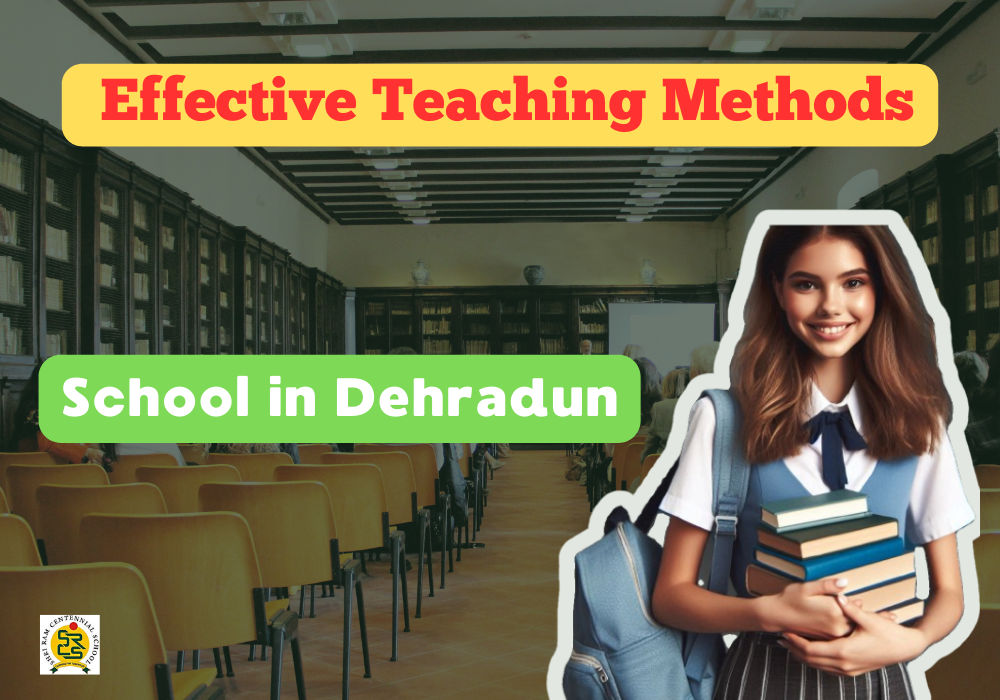In a significant development for the educational landscape of Dehradun, a team of researchers from the esteemed SRCS Faculty has published groundbreaking research that sheds light on highly effective teaching methods. This research, titled “Enhancing Student Engagement and Learning Outcomes: A Study of Effective Teaching Methods in Dehradun Schools“, has the potential to revolutionize classroom dynamics and empower educators to achieve remarkable results.
The research team, led by Dr.Ananya Sharma, a renowned education specialist at SRCS, meticulously studied a variety of teaching methodologies implemented in Dehradun schools. This comprehensive study involved observing classrooms, interviewing educators and students, and analyzing academic performance data. The researchers focused on identifying teaching styles that consistently produced positive learning outcomes, fostered student engagement, and nurtured a love for learning.
Key Findings of the SRCS Faculty Research on Effective Teaching Methods

The SRCS Faculty research identified several key factors that contribute to effective teaching methods in Dehradun’s educational ecosystem. Here’s a closer look at some of the most impactful findings:
-
Emphasis on Interactive Learning: The research highlights the importance of moving away from traditional teacher-centered lectures and embracing effective teaching methods that promote interactive learning. This includes incorporating activities, discussions, group projects, and role-playing exercises that encourage students to actively participate in the learning process. By engaging students in critical thinking and problem-solving exercises, educators can foster a deeper understanding of concepts and ignite a passion for lifelong learning.
-
Technology Integration: The study emphasizes the power of technology as a valuable tool to enhance effective teaching methods. Integrating technology strategically in the classroom can create engaging learning experiences, cater to diverse learning styles, and provide access to a wider range of information and resources. However, the research underscores the importance of using technology effectively, ensuring it complements, not replaces, traditional teaching methods.
-
Personalized Learning: The research team found that personalized learning approaches significantly improve student engagement and academic performance. This involves tailoring instruction to individual student needs, strengths, and weaknesses. By employing differentiated instruction techniques, educators can create a learning environment where every student feels challenged and supported to reach their full potential.
-
Fostering a Growth Mindset: The research emphasizes the significance of nurturing a growth mindset among students. This involves encouraging students to view challenges as opportunities for learning and growth. By helping students develop a belief in their ability to learn and improve, educators can empower them to persevere through difficulties and achieve academic success.
-
Building Strong Relationships: The study highlights the importance of building strong relationships between educators and students. When students feel valued, respected, and supported by their teachers, they are more likely to be engaged in the learning process and achieve their academic goals. Creating a positive and inclusive classroom environment fosters a sense of belonging and motivates students to actively participate.
Benefits of Effective Teaching Methods for Dehradun Schools

The implementation of effective teaching methods, as identified in the SRCS Faculty research, can yield a multitude of benefits for schools in Dehradun, students, and educators. Here are some of the most significant advantages:
-
Enhanced Student Learning: Effective teaching methods lead to deeper understanding, improved critical thinking skills, and a stronger foundation for future learning. Students become more engaged in the classroom, take greater ownership of their learning, and demonstrate significant academic progress.
-
Increased Student Motivation: Interactive and engaging teaching methods spark students’ curiosity and ignite a passion for learning. Students become more motivated to participate in classroom activities, take initiative in their studies, and strive for excellence.
-
Improved Teacher Satisfaction: Effective teaching methods empower educators to create a positive and productive classroom environment. Teachers who utilize these methods experience greater satisfaction in their profession, as they witness the positive impact on their students’ learning and development.
-
Positive Impact on School Community: When students are engaged and motivated, the entire school community benefits. There’s a more positive learning environment, stronger student-teacher relationships, and a culture of continuous improvement that fosters academic excellence.
Call to Action: Unleashing the Power of Effective Teaching Methods in Dehradun

The SRCS Faculty research offers a roadmap for educators in Dehradun to unlock the potential within their classrooms through effective teaching methods. Here are some ways to translate these findings into action:
- Professional Development: Schools and educational institutions can organize workshops and training sessions focused on the implementation of interactive learning strategies, technology integration, and differentiated instruction techniques – all core components of effective teaching methods.
- Resource Sharing: Creating a platform for educators to share successful lesson plans, teaching materials, and best practices related to effective teaching methods can foster collaboration and continuous improvement.
- Community Engagement: Partnering with parents and community members can provide additional resources and support for educators implementing these new effective teaching methods. Parents can be encouraged to create a learning-supportive environment at home that complements classroom activities.
- Student Feedback: Regularly soliciting feedback from students about their learning experience with effective teaching methods can provide valuable insights into their effectiveness. This allows educators to tailor their approach and ensure student engagement.
A Brighter Future for Dehradun’s Students with Effective Teaching Methods

By embracing the insights from the SRCS Faculty research and actively implementing these effective teaching methods, Dehradun’s educational institutions have the potential to create a future where:
- Students are actively engaged in the learning process, taking ownership of their education through effective teaching methods.
- Classrooms are transformed into vibrant hubs of intellectual curiosity and exploration, fostered by effective teaching methods.
- Every student feels empowered to reach their full potential, regardless of background or learning style, with the support of effective teaching methods.
- Dehradun’s schools become renowned for fostering a love of learning and nurturing future generations of critical thinkers and innovators, thanks to the implementation of effective teaching methods.
The groundbreaking research from the SRCS Faculty serves as a catalyst for positive change in Dehradun’s educational landscape. With dedication, collaboration, and a commitment to fostering a love of learning through effective teaching methods, educators in Dehradun can unlock a brighter future for their students.
Conclusion: A Brighter Future for Education in Dehradun
The groundbreaking research from the SRCS Faculty provides valuable insights into effective teaching methods that can significantly improve the educational landscape of Dehradun. By implementing these strategies, educators can create engaging learning environments, empower students to reach their full potential, and shape the future generation of successful learners. This research serves as a springboard for further exploration and collaboration among educators in Dehradun, paving the way for a brighter future of education in the city.
The dedication and expertise of the SRCS Faculty research team deserve recognition for their contribution to this significant advancement. Their work has the potential to create a ripple effect, inspiring educators across Dehradun to embrace innovative teaching methods and empower students to become lifelong learners and future leaders.
However, the journey towards educational excellence is an ongoing process. Further research is needed to explore the long-term impact of these methods on student achievement and to identify additional strategies that cater to the evolving needs of learners in the digital age. Additionally, fostering a culture of continuous learning among educators themselves is crucial. Providing opportunities for professional development and encouraging collaboration will ensure that educators remain equipped with the latest knowledge and skills to implement effective teaching methods effectively.
By embracing the insights from this research, fostering a spirit of collaboration, and prioritizing continuous learning, Dehradun’s educational institutions have the potential to become beacons of academic excellence. This will not only benefit students within the city but also serve as a model for educational reform across the region, inspiring a generation of passionate learners and future leaders.










